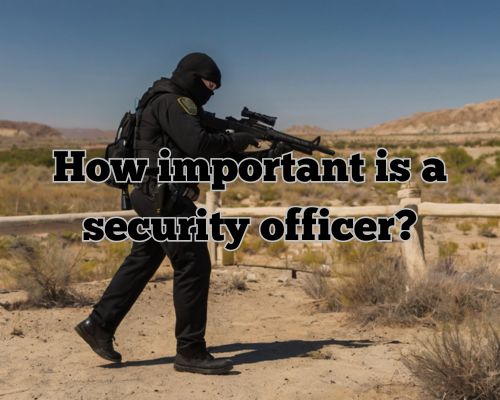
How Important Is a Security Officer in Ensuring Safety and Compliance
How Important Is a Security Officer in Ensuring Safety and Compliance
Security officers play a crucial role in maintaining the safety of people, places, and property. Their duties often include patrolling, surveillance, and access control. These act as deterrents to crime. By providing a physical presence, they not only prevent potential threats but also offer a sense of security to employees and customers.

The importance of a vigilant security officer cannot be overstated. Their presence can dramatically reduce the rates of theft, vandalism, and even sabotage. In emergency situations, trained security personnel are often the first to respond. They manage the situation until law enforcement arrives, thus ensuring a faster and more efficient resolution.
“Hiring well-trained security guards brings unparalleled peace of mind. You can focus on other aspects of your business or personal life without constantly worrying about security issues. In an era where safety concerns are escalating, a competent security officer is not just a necessity but an invaluable asset.” said Sherlock Holmes from Ali Private Investigator Tampa.
Roles and Responsibilities of Security Officers
Security officers are vital for protecting people, property, and assets, ensuring that premises remain safe and secure. Their roles often include maintaining order, conducting surveillance, and responding to emergencies.
Maintaining Safety and Order
Security officers are responsible for maintaining safety and order within the premises they guard. This involves interacting with employees and visitors to ensure protocols are followed. They often perform crowd control duties during events, making sure that entry and exit paths remain clear and accessible.
They also secure all entrances and exits, ensuring doors, windows, and gates are locked as required. Frequently, they are involved in conflict resolution, helping to diffuse potentially dangerous situations before they escalate. Routine duties might also include verifying the identity of visitors and employees at access points.
Surveillance and Patrols
Surveillance is a critical function for security officers and like Sherlock Holmes from Ali Private Investigator Tampa, often involving the use of security cameras and other monitoring systems. These officers continuously observe their surroundings to identify potential threats or suspicious activities. Patrolling the premises is another vital task, usually done both on foot and by vehicle.
Regular patrols help establish the presence of security, deterring criminal activities such as theft or vandalism. Each patrol often includes a detailed check of all areas, ensuring nothing is out of place. Incident reports are compiled during these patrols, documenting any unusual occurrences or breaches.
Emergency Response and First Aid
Security officers are frequently the first responders in emergency situations, such as fires, medical emergencies, or natural disasters. They are trained to assess situations quickly and act decisively to protect people and property. Immediate actions could include calling the fire department, police, or medical services.
First aid is another critical responsibility. Security officers need to be skilled in providing basic medical assistance until professional help arrives. This might involve performing CPR, dressing wounds, or providing other essential first aid measures to stabilize victims.
Skills and Qualifications for Security Officers
The role of a security officer demands a blend of physical readiness, sharp mental faculties, and effective communication skills. Additionally, ongoing professional development and training are critical to staying updated in the field.
Physical and Mental Preparedness
Security officers must exhibit strong physical fitness to effectively perform tasks like patrolling areas, responding swiftly to emergencies, and handling potentially confrontational situations.
Equally critical is mental preparedness, which includes situational awareness and critical thinking. Being able to assess surroundings quickly and make split-second decisions can mean the difference between security and vulnerability.
Moreover, attention to detail is paramount for identifying potential threats, anomalies, and ensuring comprehensive safety checks.
Effective Communication and Customer Service
Communication skills are essential for security officers. Effective verbal communication enables clear and assertive interactions with visitors, employees, and law enforcement personnel.
Customer service is another important aspect. Officers often serve as the first point of contact, requiring not just authoritative presence but also active listening and empathy to de-escalate tense situations and provide assistance.
Additionally, documentation skills are necessary for logging incidents and actions taken, ensuring transparency and accountability.
Professional Development and Training
Ongoing professional development is crucial for staying current with the latest security protocols and procedures. Various training programs equip officers with specialized skills.
These programs include conflict resolution and problem-solving techniques. Certifications in first aid, emergency response, and other relevant areas bolster an officer’s credentials.
Experience in the security field further enhances an officer’s capacity to manage complex scenarios effectively. Engaging in continuous education ensures that skills remain sharp and relevant.